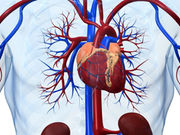Neither increase in mean pressure gradient, systolic pulmonary artery pressure predicted outcome
TUESDAY, July 25, 2017 (HealthDay News) — For patients with asymptomatic aortic stenosis (AS), neither increase in mean pressure gradient (MPG) nor systolic pulmonary artery pressure (SPAP) predicts outcome, according to a study published online July 19 in JACC: Cardiovascular Imaging.
Coppelia Goublaire, M.D., from the Hôpitaux de Paris, and colleagues enrolled 148 patients with pure, isolated, asymptomatic AS and preserved ejection fraction and normal peak SPAP who underwent a symptom-limited exercise echocardiography. The authors recorded occurrence of AS-related events.
The researchers observed no complications. Twenty-four percent of participants had an abnormal exercise test and were referred for surgery. Thirty-four percent of the 112 patients with a normal exercise test had abnormal exercise echocardiography (MPG >20 mm Hg and/or SPAP at peak exercise >60 mm Hg); these 112 patients were managed conservatively. An AS-related event occurred in 30 patients during a mean follow-up of 14 ± 8 months; 25 patients were operated on. AS-related events or aortic valve replacement were not predicted by MPG increase >20 mm Hg or peak SPAP >60 mm Hg (all P > 0.20); however, baseline AS severity was an important prognostic factor (all P < 0.01).
“We confirm and extend the importance of exercise testing to unveil functional limitation,” the authors write. “More importantly, neither the increase of MPG nor SPAP at peak exercise was predictive of outcome. Our results do not support the use of these parameters in the risk-stratification and clinical management of asymptomatic AS patients.”
Abstract/Full Text (subscription or payment may be required)
Editorial (subscription or payment may be required)
Copyright © 2017 HealthDay. All rights reserved.








